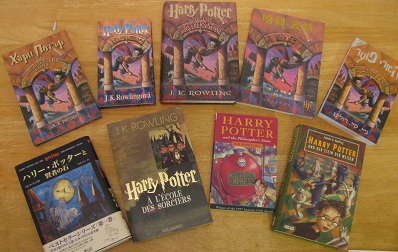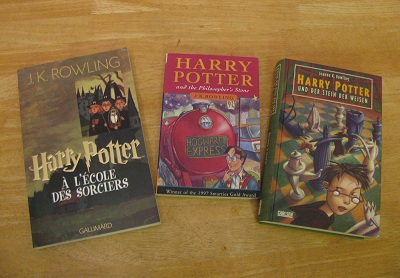It’s Sonderling Sunday, that time when I play with language by looking at the German translation of children’s books. You do not have to speak German to enjoy this — I am not at all fluent myself. The fun is in getting a window into a different way of looking at things.
Tonight, I’m going to tackle three languages. Because, yes, it’s time to start in on Harry Potter. As it happens, copies of Harry Potter and the Philosopher’s Stone in other languages were fun souvenirs my husband could buy as he traveled around Europe with the US Air Force Band. So we currently have 9 editions of the book, from 9 different countries.
From the top, this picture has a book from Bulgaria, the Czech Republic, America, China, Israel, Japan, France, the United Kingdom, and Germany. I’ve read four of them, the American, British, German, and French. I hasten to add that I managed to read the German and French editions with copious checks back to the original. But I thought it would be fun to add some French to this week’s Sonderling Sunday. I will refer, of course, to the original British edition, though it won’t hurt to see if I can find some differences between it and the American edition.
At first glance, it looks like the Germans translated their title from the more classical British edition, Harry Potter and the Philosopher’s Stone, but that the French translated from the American, Harry Potter and the Sorcerer’s Stone. (Incidentally, I didn’t like that change. I guess they thought Americans were too stupid to know what the classical Philosopher’s Stone was?) But looking closer, the French title, Harry Potter à L’École des Sorciers means “Harry Potter at the School of the Sorcerers,” which seems like a good title, more about Hogwarts, which is really what the first book is about. The German title, Harry Potter und der Stein der Weisen means “Harry Potter and the Stone of the Wise.” When I ask Google to translate “Philosopher’s Stone” into German, Stein der Weisen is indeed what it comes up with.
Let’s go on to the first chapter, first sentence. I can’t imagine figuring out all the symbols in Bulgarian, Hebrew, Chinese, or Japanese, but just for fun, I think I’ll include the Czech first sentence as well as English, German and French:
“The Boy Who Lived”
“Mr and Mrs Dursley, of number four, Privet Drive, were proud to say that they were perfectly normal, thank you very much.”
Auf Deutsch:
Ein Junge überlebt (“A boy survives”)
Mr. und Mrs. Dursley im Ligusterweg Nummer 4 waren stolz darauf, ganz und gar normal zu sein, sehr stolz sogar.
(“Mr. and Mrs. Dursley at Privet Way number 4 were proud to be totally and completely normal, very proud indeed.”)
En Français:
Le Survivant (“The Survivor”)
Mr et Mrs Dursley, qui habitaient au 4, Privet Drive, avaient toujours affirmé avec la plus grande fierté qu’ils étaient parfaitement normaux, merci pour eux.
(“Mr. and Mrs. Dursley, who lived at 4, Privet Drive, had always affirmed with the greatest pride that they were perfectly normal, thank you.”)
And in Czech:
Chlapec, který z?stal naživu (“The boy, who remained alive”)
Pan a paní Dursleyovi z domu ?íslo ?ty?i v Zobí ulici vždycky hrd? prohlašovali, že jsou naprosto normální, ano, d?kujeme za optání.
Fed into Google translate, this comes out: “Mr. and Mrs. Dursley of house number four, Privet Drive always proudly claimed that they were perfectly normal, yes, thank you for asking.”
Okay, that took lots of time, so I think that’s all I’ll do with Czech! And, of course, I have absolutely no idea how you pronounce it. I think someone decided to switch all English’s most obscure letters, like z and v, and turn them into vowels. (When we were in the Czech Republic, playing the alphabet game on the road was really fun, because it totally switched which letters were difficult and which were not. We had to find an English language truck for one of the letters that is normally simple, but all the normally hard letters were ridiculously easy.)
Going on, I’ll focus on interesting phrases. One thing I do remember from reading this: German is so logical about potions, wands, and spells. They are simply magic drinks, magic sticks, and magic words. I’m not sure we’ll get to those in Chapter One, but if I remember right, French tended to have special words, like English does. The Germans are more economical and logical in their language.
Still from the first paragraph:
“strange and mysterious”
= merkwürdige und geheimnisvolle (“noteworthy or mystery-full”)
= d’étrange ou de mystérieux (That’s almost too close to be interesting!)
“drills”
= Bohrmaschinen (“boring machines”)
= perceuses
“beefy”
= bullig
= massif
“a very large mustache”
= einen sehr gro?en Schnurrbart
= une moustache de belle taille (“a mustache of good size”)
“for spying on the neighbors”
= zu den Nachbarn hinüberspähen
= pour espionner ses voisins
“good-for-nothing”
= Nichtsnutz (“nothing-use”)
= bon à rien
“unDursleyish”
= undursleyhaft
= un Dursley
“shuddered to think”
(not translated directly in German, just made into a question – “What would the neighbors say, should the Potters one day cross their street?”)
= tremblaient d’épouvante à la pensée (“trembled with fear at the thought”)
“dull, grey Tuesday”
= trüben und grauen Dienstag
= mardi . . . gris et triste
“most boring tie”
= langweiligste Krawatte
= cravate la plus sinistre
“None of them noticed a large tawny owl flutter past the window.”
= Keiner von ihnen sah den riesigen Waldkauz am Fenster vorbeifliegen.
(“None of them saw the giant wood owl that flew by the window.”)
= Aucun d’eux ne remarqua le gros hibou au plumage mordoré qui voleta devant la fenêtre.
(“None of them noticed the large owl of bronze plumage that fluttered past the window.”)
“pecked Mrs Dursley on the cheek”
= gab seiner Frau einen Schmatz auf die Wange
= déposa un baiser sur la joue de Mrs Dursley
“tried to kiss Dudley goodbye”
= versuchte es auch bei Dudley mit einem Abschiedskuss
= essaya d’embrasser Dudley
“having a tantrum”
= einen Wutanfall hatte
= était en proie à une petite crise de colère
(“was suffering from a small crisis of choler” – the French make it sound so refined!)
“throwing his cereal at the walls”
= die Wände mit seinem Haferbrei bewarf
= s’appliquait à jeter contre les murs de la pièce le contenu de son assiette de céréales
(“applied to throw against the walls of the room the contents of his plate of cereal” – again, so refined.)
“Little tyke”
= Kleiner Schlingel
= Sacré petit bonhomme
“chortled”
= gluckste
= gloussa
“the first sign of something peculiar”
= zum ersten Mal etwas Merkwürdiges auf
= la première fois un détail insolite
“a cat reading a map”
= eine Katze, die eine Stra?enkarte studierte
= un chat qui lisait une carte routière
“a tabby cat”
= eine getigerte Katze (“a be-tigered cat”)
= un chat tigré
“a trick of the light”
= eine Sinnestäuschung (“a sense-illusion”)
= abuser par un reflet du soleil sur le trottoir (“fooled [abused] by the reflection of the sun on the sidewalk”)
“mirror”
= Rückspiegel
= rétroviseur
(I think I’m going to call my rearview mirror my rétroviseur from now on.)
This is a word I know well from living in Germany. We always thought it funny the German word is simpler than the English:
“traffic jam”
= Stau
= embouteillages
“some stupid new fashion”
= irgendeine dumme neue Mode
= une nouvelle mode particulièrement stupide
“a huddle of these weirdos”
= eine Ansammlung dieser merkwürdigen Gestalten
= un groupe de ces olibrius
“The nerve of him!”
= Der hatte vielleicht Nerven!
= Quelle impudence! (I like the French translation best here!)
“some silly stunt”
= eine verrückte Verkleidung
= une animation de rue
“collecting tin”
= Sammelbüchse
= la moindre boîte destinée à récolter de l’argent
(“the lower box destined to harvest money”)
And this one is given a cultural slant:
“a large doughnut”
= einem gro?en Schokoladenkringel
= un gros beignet
That’s enough for tonight! I’ll stop with visions of doughnuts, Schokoladenkringeln and beignets.
It takes much longer to do three languages, but I am finding it fun. I thought of German as the wordier language, but French really seems to draw it out with long phrases instead of long words.
Perhaps this activity is merely une animation de rue, but it’s diverting. And I never did claim to be normal like the Dursleys. In lieu of an Abschiedskuss for my readers, I’ll give my son a Schmatz auf die Wange and call it a night!

